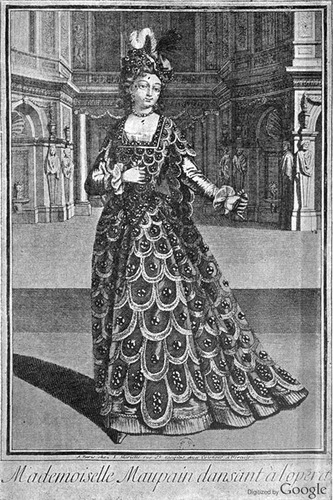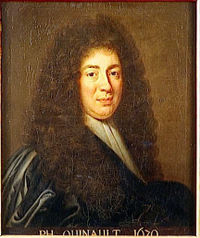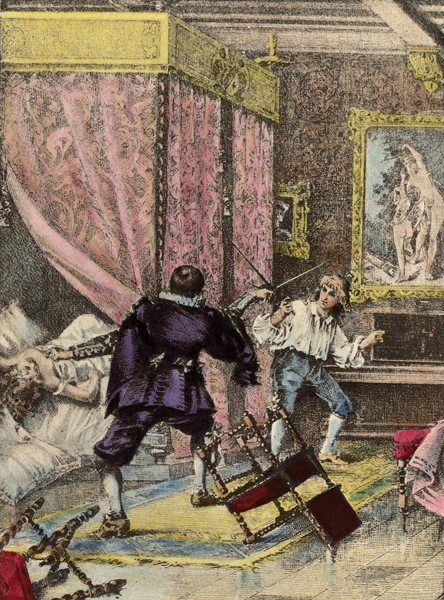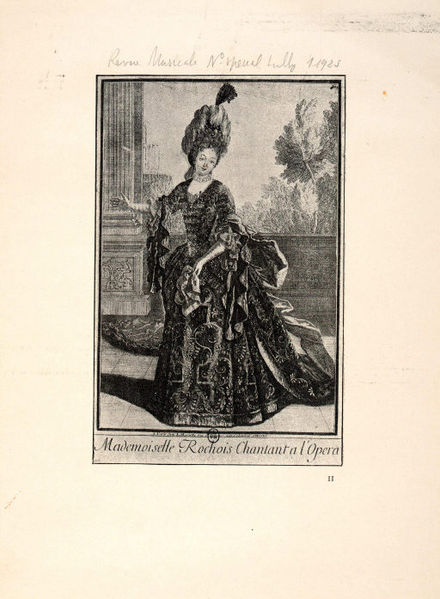SIDE STORIES, ANECDOTES AND CHARACTERS, Part Two-THE TRUE STORY OF LA MAUPIN, Last Chapter

Chapter Three:
For her debut in the Paris Opera company, Mademoiselle de Maupin is featured as the Grecian Goddess Pallas in the casting of Cadmus and Hermione, a lyrical tragedy composed by Lully on lyrics of Quinault.
Julie appears, standing motionless in a flying white carriage, which is slowly lowered by mechanics from the gridiron near the rooftop, down to the stage. She wears a white toga and Greek silver helmet, and holds a silver bow and arrow. Landing onstage, she steps out solemnly, and walks towards the audience, in pace with the music. Like a living statue, she doffs her helmet and , graciously shaking her head, has a wave of liquid, curly, auburn hair cascading to her shoulders, like a waterfall, as she begins to sing a divine aria.
The audience is immediately under her spell. She steals the show. Next morning, she becomes the talk of the town: a star is born! And she will spice up this sweet smell of success, as stars ought to, with an unprecedented string of scandals!
Its always the same with her: she feels attracted to someone, exercises her seduction, falls in love, creates drama, quarrels, gets bored, meets another personand starts all over again!
She makes Thevenard jealous, by having affairs with men and women of the company, among them Marthe Le Rochois, the undisputed lead singer, addicted to feature roles.

She has enemies, too: Dumesnil, a former cook and a haute-contre singer( mens high-pitched voice) is a dull and rude braggart infatuated with himself, who spends his time behind the scenes trying to kiss and grope the actresses. She hates him. One day he makes advances towards her, she rebuffs him; as he insults her, she promises to revenge.
A few nights later, she dresses as a man, and in the dark streets of Paris ( recently invented city lights are scarce), waits for Dumesnil as he comes back to his home. He does not recognize her in the dark. She challenges him to a duel. Sweating and stuttering for fear, he refuses. Then she hits him several times with the guard and pommel of her sword, and steals from him his pocket watch and his golden tobacco box.
The next day, Dumesnil meets the company in the Opera House. He has a black eye and many bruises. He explains he has been attacked by three armed thieves, who stole his watch and golden box. Triumphantly, La Maupin shouts You liar! You coward! It was not three thieves, it was me, and me alone! and throws him the watch and box. She ridiculed him, and she has one more enemy forever.

At the same time, she goes on training her fencing, and spends a lot of time in salles darmes , when she is not singing. Fencing, before this time, was strictly reserved to men. Times are changing, and some fencing women begin to be known, but none of them has the skills of Mademoiselle de Maupin. Only the best of men can beat her. Her renown in this other field spreads throughout Paris and Versailles.
Monsieur , as is called Louis XIV brother, le Duc dOrlans, patrons a grand ball in his Palace in the Marais quarter of Paris, which the King will attend, along with hundreds of other guests. Mademoiselle de Maupin is now so famous, she is also invited.
Against all odds, she dares to appear in the most luxurious mans attire of brocade, with a foil to her hip! Seeing in this noble crowd a charming young lady chatting with three gentlemen, she invites her to dance and becomes flirtatious. The three young nobles are infuriated, and they try to stop Julie. They go out in the gardens, and she fences against the three of them together, and defeats them! The Palace guard gets hold of her, and she is brought to Monsieur, just as the King approaches his brother. He is explained what happened just before.
So you are La Maupin the Jade! I heard about your deeds and accomplishments . Do you ignore my decree banning duels?, His Majesty says. She curtsies and mumbles words of apology.
For two days , she lives in anxiety ( what will the King decide?) until she learns the King finally considers his decree forbade duels for MEN, with no mention of WOMEN: as she is an isolated case, he does not sue her. But as the royal reprimand has made her cautious, she keeps quiet for some time.

Later, she seduces a married woman, and they are surprised by the husband coming home unexpectedly. He wants to strike them, she defends herself with her sword, they fence, and she wounds him. This time, she is really scared by the possible consequences, and flees to Brussels( but the husband does not complain to Police nor Justice, to hide his misfortune).
Being abroad in Brussels, under Spanish government then, she feels safer, and is hired there in the Opera du Quai au Foin, where she stars in several works of Lully. She has a liaison with the Elector of Bavaria, who has been nominated Governor of the Spanish Netherlands by the Holy Emperor. The Elector soon wants to leave her for a beautiful Comtesse. He asks to the latters husband, the Comte, to deliver to Julie a purse full of a fortune in gold coins, to signify their estrangement and soothe it.
La Maupin, in anger, throws the purse back to the face of the Comte, shouting: Keep this change money, its only good enough for a cuckold like you!.
She comes back to Paris, and its Opera House. As Mademoiselle Le Rochois retired, La Maupin now alternates with Fanchon Moreau and Mademoiselle Desmartins in feature roles. These are the heydays of her singing career. Andr Campra, one of the leading French composers, having in mind her unique and uncanny voice, writes especially for Mademoiselle de Maupin the part of Clorinde in his lyrical tragedy Tancrede .

She falls in love once again, and as her love is not shared, she pretends, to no avail, to commit suicide. During her recovery, she is helped and assisted by Marie-Thrse de Senecterre, Marquise de Florensac, reputed as la plus belle femme peut-tre qui fut en France( Saint-Simon, in his Memoirs) and the gentlest, sweetest and most simple in her beauty. They become close, but chaste , friends, enjoying the sweetness of sincere friendship between young ladies sharing love of life, art, conversation and gigglesbut suddenly, ill fate strikes again: within two days, Madame de Florensac dies, leaving Mademoiselle de Maupin alone again, loveless, friendless and desperate.
Julie, for the first time in her life, becomes tired, so very tiredShe looks around , and sees no one to turn to: DArmagnac is old and sick, Luynes is married and lives abroad, Srannes is dead, Thevenard is penniless and drowns his failures in alcohol
Is it because she senses death is drawing near? Because she feels remorse for her scandalous past and her life in turmoil? Because she cannot stand anymore to be considered an outcast in this formal and rigid century?...or because, the impulses of young age fading away with her youth, she searches for a deeper meaning to her existence? Who knows? Anyhow, she becomes more and more religious: a rosary adorns her hand which once held the sword, and her lips, which worded profane songs, now murmur prayers for salvation. She intends to retire into a nunnery, but is rejected
Crushed by loneliness, she finally turns to her husband, Maupin: he accepts to come back to her. She gives up fencing. She gives up passions and adventures. Soon she will give up singingdrop by drop, life is drained out of her. We ought to imagine Julie, staying at home in her armchair, looking out the window, waiting for Maupin, as the day ends and darkness fills the street
Did she find peace at last? Is this the sad ending of a frantically adventurous life of fun, or the happy and serene ending to a comedy of errors, mistakes and scandals?
Maybe you can tell : mais moi, je ne sais pas . Each and every life is a mystery.
This aging Lady dies in 1707. She is not 37 years old yet.
THE END.
Pictures, from top to bottom:
(1) Mademoiselle de Maupin on stage at the Paris Opera House
(2) Jean-Baptiste Lully
(3) Philippe Quinault
(4) La Maupin duelling with her lover's husband...
(5) Marthe Le Rochois, first singing star of the French Opera



It's said that the candle that burns brightest burns briefest. Thank you for this amazing story!